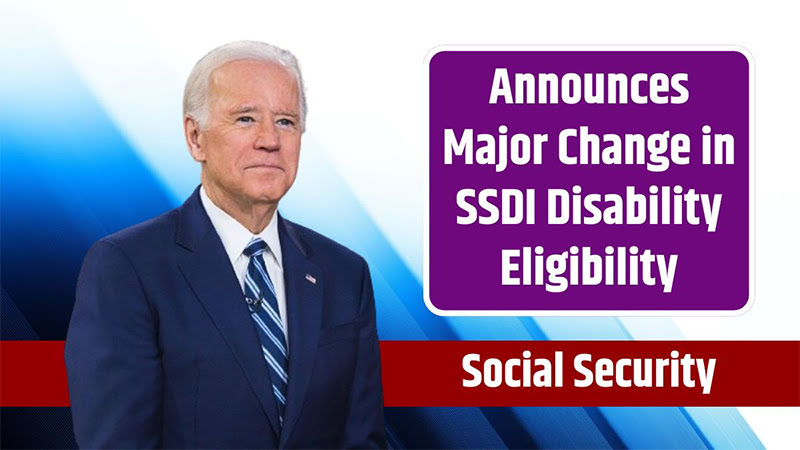The Social Security Administration (SSA) is significant in giving monetary help to Americans who can’t work because of handicaps. The Social Security Administration (SSA) helps people maintain a higher quality of life by ensuring that they receive the necessary financial assistance through its Social Security Disability Insurance (SSDI) and Supplemental Security Income (SSI) programs. These projects are essential for some, yet the method involved with fitting the bill for inability advantages can be intricate and frequently bulky for candidates.
Major Social Security Disability Change Announced
The Social Security Administration (SSA) recently announced significant changes to the process by which disability eligibility is determined in order to streamline this procedure and enhance applicants’ overall experience. These updates are intended to improve on the evaluation process, especially in how candidates’ previous work chronicles are surveyed. This drive is important for a more extensive legislative push to upgrade bureaucratic administrations, driven by President Biden’s Leader Request on Changing Administrative Client Experience and Administration Conveyance to Reconstruct Confidence in Government.
Also Check:-
Hyundai, KIA Class Action Settlement
Deciding Qualification for Handicap Benefits
The Social Security Administration (SSA) has recently made significant adjustments to its disability evaluation procedure, making it easier and more efficient for applicants to apply for disability benefits. These progressions center basically around improving on how past work history is explored, a key piece of deciding qualification for handicap benefits.
Incapacity Assurance Process
As of June 22, 2024, the SSA will carry out an overhauled strategy for assessing a candidate’s work history during the incapacity assurance process. The most significant change is limiting the evaluation period to the most recent five years, rather than the previous 15 years. This change is meant to make it easier for applicants who had to provide a lot of information about their work history before, which could be hard to remember accurately and completely.
Exclusion of Short-Term Employment
One more outstanding update in the assessment cycle is barring any business that endured less than 30 schedule days from thought. This change will probably diminish the intricacy and work on the exactness of the work history evaluation, zeroing in just on more supported business periods that are more characteristic of a candidate’s work capacity.
Also Check:-
Social Security $2,000 Debit Car
Benefits of Changed Disability Eligibility
These progressions are supposed to upgrade the general productivity of the handicap assessment process in more than one way:
Reduced Administrative Burden: By restricting the work history survey to five years and barring transient positions, the SSA lessens the data candidates need to accumulate and submit. This makes the application process less overwhelming and can assist candidates with zeroing in on assembling just the most relevant and late work subtleties.
Improved Decision-Making Accuracy: SSA assessors are better able to evaluate an applicant’s current work abilities by focusing on relevant, more recent work experience. This pertinence is essential for fair and productive direction, as it mirrors a candidate’s new work abilities without the messiness of obsolete or unessential work history.
Faster Processing Time: The evaluation process may be sped up by concentrating on recent, pertinent job history and reducing the amount of information reviewed. This implies candidates can get choices and, hence, possibly, helps all the more rapidly, diminishing the monetary and profound pressure related with long holding up periods.
Broader Programs Regulatory Updates
In order to enhance its disability programs, the SSA has implemented a number of regulatory updates with an emphasis on expanding accessibility and enhancing service delivery:
- Public Assistance Household Definition –The Supplemental Security Income (SSI) program’s definition has been expanded by the SSA to help more people and families qualify for benefits..
- Exclusion of Food Value from SSI Calculations –Food help will never again influence the estimation of SSI benefits, permitting beneficiaries to get food help without influencing their advantage qualification or sums.
- Nationwide Expansion of Rental Subsidy Exception –Recently restricted to seven expresses, this approach currently applies across the country, barring specific rental endowments from pay computations, hence facilitating the lodging cost trouble for SSI beneficiaries.
The SSA’s commitment to increasing the effectiveness and responsiveness of its programs for Americans with disabilities is reflected in these updates, which aim to make SSI more accessible, guarantee comprehensive support, and streamline administrative procedures.
Also Check:-
Project Reduce Veterans Benefits
Meteor Shower Tonight in the US
Final Words
Candidates looking for both SSDI and SSI benefits should finish a five-step process to be endorsed, which incorporates giving a work history. To fit the bill for handicap benefits, candidates should show that their inability will prevent them from accomplishing significant work for somewhere around 1 year or is supposed to bring about death. To determine whether the applicants’ disability actually prevents them from performing the job, a work history is required. However, administration claims that it can be challenging for some applicants to recall 15 years of prior work experience. The organization likewise no longer expects candidates to list work experience that went on for under 30 calendar days.
